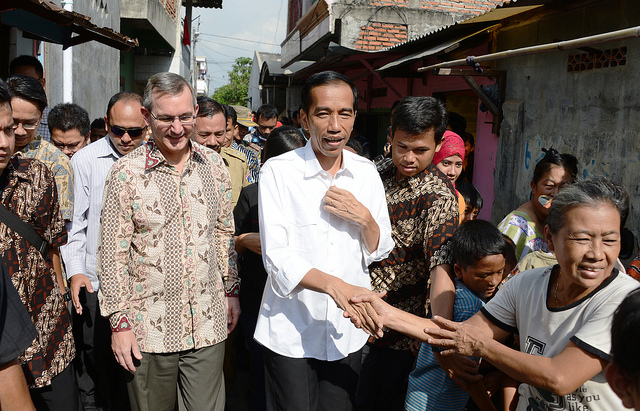No doubt by now most Australian readers would have heard that the popular Jakarta governor, Joko Widodo, also known as ‘Jokowi’, is the frontrunner for Indonesia’s upcoming presidential election. His meteoric rise from humble furniture entrepreneur in Solo to what could be the Presidential Palace is best explained simply by his genuine push for effective governance and a crackdown on corruption as well as his grassroots, ‘Mr Fix-it’ image. In short, he’s riding an Obama-like wave of hope and change in Indonesia—most importantly, hope that change is possible and that politics need not be dominated by stale and self-serving elites.
Nearly 32% of Indonesians recently polled by CSIS Jakarta have thrown their support behind Jokowi (Prabowo, the next preferred candidate, trails behind with 14.3%). While it’s not a fait accompli, it’s time to consider what a Jokowi administration might look like. How Indonesia views its strategic environment and how it chooses to manage its diplomatic relations is of great interest to Australia. As the past six months have shown, diplomatic disruptions to the relationship, for one, could harm our defence and security cooperation.
Without making predictions about who’ll fill a Jokowi cabinet, it’s fair to say there’ll be a period of settling in after the elections. As Gary Hogan points out, ‘If the new Indonesian president is allowed to form a cabinet of clean, capable, technocratic ministers, able to implement sensible fiscal and economic policy, the stake of Australian business in Indonesia’s future looks promising’. The same roughly applies to those who fill the roles of defence minister and coordinating minister for political, legal and security affairs. As always, people matter.
Looking to the bigger strategic picture, Jokowi will have to contend with challenges posed by the increasingly complex relationship between China and ASEAN states, exacerbated by a raft of territorial disputes. For its part, after years of maintaining its neutrality, Indonesia formally announced in early March its own dispute with China’s claim over parts of its territory in the South China Sea. As Ann Marie Murphy notes in today’s PacNet newsletter, this is ‘likely to heighten tensions on an issue that is already fraught with them’. Indonesia will have to work harder to maintain regional stability—and in an environment less conducive to the norms of peaceful settlement of disputes and non-interference from external actors. Jokowi has dipped his toe into ASEAN matters hosting a meeting with governors and mayors of ASEAN capital cities, but it’s not the same as strong Indonesian leadership of ASEAN in the face of a more provocative China.
And that’s where a good VP will help. An experienced hand will help bolster what Jokowi lacks in foreign policy street cred. So far, the serious talk has been of former Vice President to SBY, Jusuf Kalla (who also served in Megawati’s cabinet), running with Jokowi. Kalla’s proven credentials in conflict resolution would be of value: he helped solve inter-religious violence in Sulawesi in 2001 and steered Aceh’s rehabilitation after the 2004 tsunami. Of all potential VP candidates, Kalla can best ease Jokowi into the realm of international politics. The same goes for having a vibrant and experienced foreign minister.
In terms of defence policy, many of the current drivers for Indonesia’s military modernisation—including a focus on maintaining territorial sovereignty and protecting its EEZ—will continue to shape decision-making during a Jokowi term in office. Defence spending will largely depend on economic performance, so we’ll have to see how the Indonesian economy fares first under the new administration before we can expect announcements to increase the defence budget. TNI’s modernisation program aims to develop a ‘Minimum Essential Force’ (MEF) by 2024 which entails major upgrades of naval, land and air capabilities as well as the development of a local defence industry. While many of those developments were driven by SBY, some have made their way into legislation, which a new president might find hard to alter. Indonesia also has a number of capability development projects and acquisition deals on the go with partner countries. Defence officials recently announced that the first batch of F-16 Fighting Falcon fighter jets as part of a US grant are due to arrive in country in October.
Turning finally to how Jokowi will deal with the military itself, there’s been some chatter about current TNI chief General Moeldoko as Jokowi’s running mate. But most opinion polls suggest the public would oppose such a degree of military involvement in politics. Irrespective of historical preferences for a ‘strong man’, Indonesians have indicated that a civilian is up to the top job. At a time when anti-corruption and clean governance are the dominant political flavours, Moeldoko has made all the right noises about reform and professionalism. Hopefully this translates into a continuation of Indonesia’s reformasi project.
For Australia, a changing of the presidential guard is an opportunity to rebuild the defence and security relationship. It’s not possible that all military exercises suspended by SBY last year will automatically and immediately resume. But a few encouraging initiatives—both from Canberra and Jakarta—early in a new administration would provide positive signs for the future. In strategic terms, with growing ambiguity in Indonesia–China relations over territory, it’s timely and appropriate for Australia and other partners to warm the relationship with Jakarta.
Natalie Sambhi is an analyst at ASPI and editor of The Strategist. Image courtesy of Flickr user US Embassy, Jakarta.


